外研版高中英语必修五Module 2A Job Worth DoingGrammar学案4
- 格式:doc
- 大小:139.00 KB
- 文档页数:9

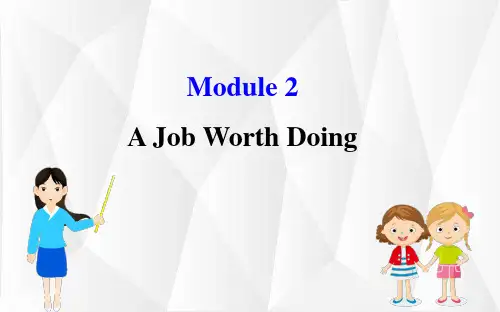


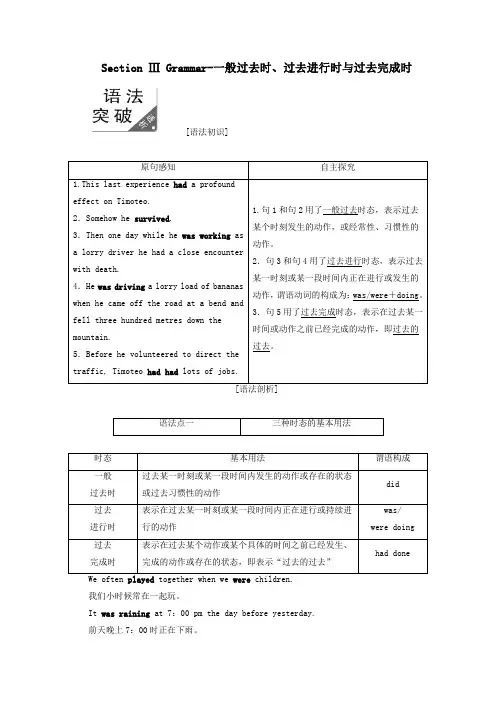
Section Ⅲ Grammar-一般过去时、过去进行时与过去完成时[语法初识]我们小时候常在一起玩。
It was raining at 7:00 pm the day before yesterday.前天晚上7:00时正在下雨。
When the teacher came into the classroom, Liu Hong had gone home.当老师走进教室时,刘红已经回家了。
集中演练11-1.单句语法填空①She had_learned (learn) some English before she came to the institute.②When I was a child, I often played (play) football in the street.③It was the third time that he had_left (leave) the key at home.④Joy said he would play football with me if I finished (finish) practicing the piano.⑤He had_worked (work) in the factory for five years before he moved here.⑥The hotel wasn't particularly good, but I had_stayed (stay) in many worse hotels.⑦An earthquake struck (strike) some parts of Italy last week, causing great damage to the local people.⑧ —Didn't the policeman notice the man breaking into the bank?—No, he was_looking (look) in the other direction.⑨Before he came to China, he had_learned (learn) Chinese for more than five years.⑩Sorry, I was_taking (take) a bath when you called me last night.1-2.单句改错⑪All the guests had appeared by ten o'clock, but the host wouldn't appear until 20 minutes later.wouldn't→didn't⑫I learned 2,000 English words by the end of last term.learned前加had⑬The thief tried to break away from the policeman who held him but failed.held→was_holding⑭John had liked to play the piano when he was in secondary school.去掉had ⑮ I had planned to meet Mr Thompson this morning but I had found there was nobody in the room when I came.去掉第二个had1.一般过去时的特殊用法(1)在时间、条件、让步、方式等状语从句中用一般过去时表示过去将来。
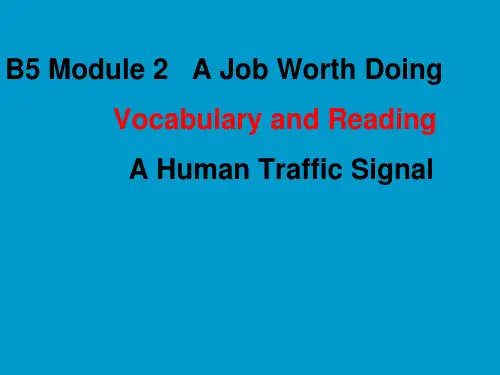

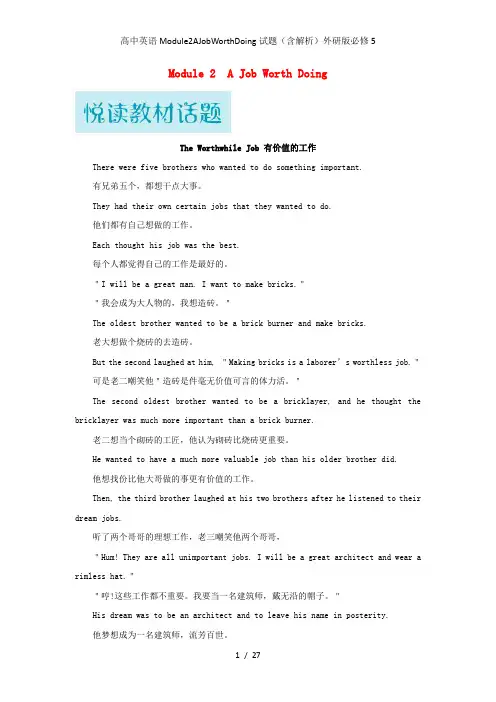
Module 2 A Job Worth DoingThe Worthwhile Job 有价值的工作There were five brothers who wanted to do something important.有兄弟五个,都想干点大事。
They had their own certain jobs that they wanted to do.他们都有自己想做的工作。
Each thought his job was the best.每个人都觉得自己的工作是最好的。
"I will be a great man. I want to make bricks.""我会成为大人物的,我想造砖。
"The oldest brother wanted to be a brick burner and make bricks.老大想做个烧砖的去造砖。
But the second laughed at him, "Making bricks is a laborer’s worthless job."可是老二嘲笑他"造砖是件毫无价值可言的体力活。
"The second oldest brother wanted to be a bricklayer, and he thought the bricklayer was much more important than a brick burner.老二想当个砌砖的工匠,他认为砌砖比烧砖更重要。
He wanted to have a much more valuable job than his older brother did.他想找份比他大哥做的事更有价值的工作。
Then, the third brother laughed at his two brothers after he listened to their dream jobs.听了两个哥哥的理想工作,老三嘲笑他两个哥哥,"Hum! They are all unimportant jobs. I will be a great architect and wear a rimless hat.""哼!这些工作都不重要。
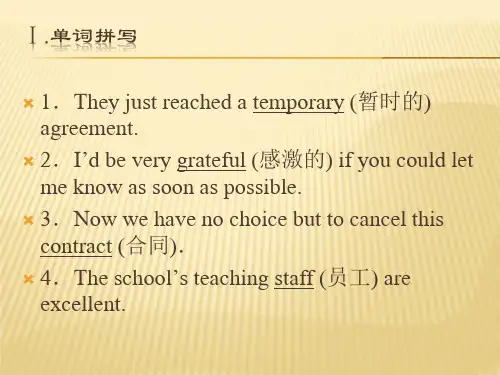
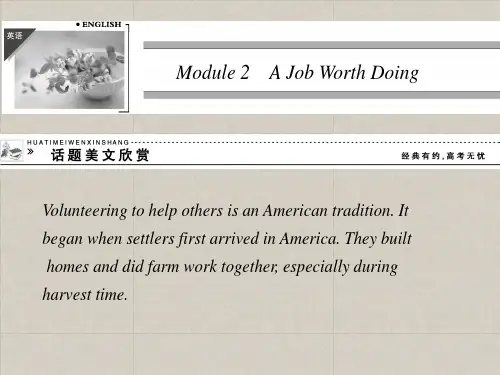
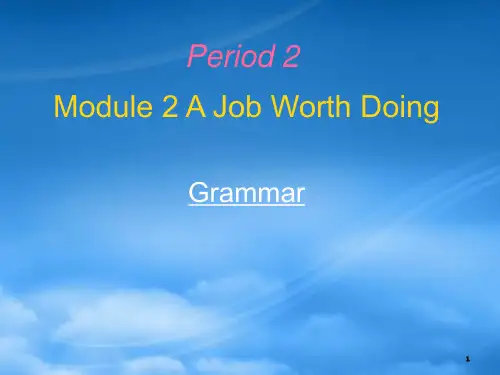
Module 2 A job worth doing Reading and Cultural CornerRead the passage again and answer the questions.A. W hy are there so many accidents on the world's most dangerous road?B. B eing a human traffic signal, what does he do to direct the traffic?C. W hat do drivers do when they pass by him?b.Why does he choose this job?A.Because:1, the bad condition of the road. The mountains rise steeply on one side and there is a sheer drop on one side.2, few drivers respect the traffic rules.A.He stands on the bend holding a large board to direct the traffic when two vehicles approach from the opposite directions,.C.Some drivers give him a tip, but most of themtake it for granted.b.Because he encountered with death once and he realized that he was lucky to survive. He felt that it was his mission in life to help others.A friend in need is a friend indeed.患难见真情灵n eye for an eye and a tooth for a tooth.以眼还眼,以牙还牙(Beauty Res in the Cove's eyes.情人眼里出西施(Don r t put the cart before the horse.不要本末倒置Every dog has his day.i i谁都有得意的时候Love me, love my dog.爱屋及乌Tt's no use crying over spilt milk.覆水难收Useful expressions and phrases•at high al十计ude • in bad condition 海拔高度很高处于糟糕的状态•in particular•the mountains rise steeply •sheer drop•in places•come off•in theory•going uphill•coming downhill•in practice•respect 十he rules 特别是,尤其是另卩些山陡哨地耸立巨大的落差某处,有些地方从…掉下从理论上说往上山方向走往下山方向走事实上遵守规贝!J•death toll has fallen •known locally as... •approach•no one pays him for it• live on •pass by•taking the human iraffic signal for grarrted•he volunteered to direct the traffic •he had a close encounter w计h 有一次他与死味申death 死亡人数减少了在本地被称为…(在时间或空间)接近,靠近某人/物没人为此付给他工资生存下去经过;不注意某人/物认为这个人工交通灯的存在是理所当然的他自告奋勇地去指挥交通擦身而过•somehow•had a profound effect on •it was his mission in life to help others•week in, week out•from dawn 十0 dusk •takes up his place on 十he bend以某种方式;对…有深远的影响帮助他人是他一生的使命从早到晚在那弯道上就位Cultural cornerGrowing JobsFast-reading■ How many jobs does the passage refer to? What are them ? TenComputer systems analyst, data analyst, database manager, health care professional, bioinformatician, home care nurse, speech pathologist, social worker, travel agent, guide.Careful readingTrue or FalseT ■ 1・ The survey is published in America・F ■ 2・ The survey does not include traditionaljobs.丁■ 3. Health care professionals will be in demand ・F ■ 4. Apart from the jobs in the survey, there willbe no new jobs in the future.J ■ 5・ To be a good guide, you need common sense, physical fitness and an outgoingpersonality ・Language learningpeople who are becoming old the business forentertainment (休闲,娱 乐产业)■ ...pienty of the newjobs, some of which we probably carft even guess. ( para.2 line 1 )Some new jobs that we dorft know now ・■ be in demandbe in need (非常需要的) ■ ageing people ■ leisure industryThe five fastest growing jobs from 2002 to 2012One road in particular, which goes north from La Paz, is considered the most dangerous road in the world.in particular特别,尤其He likes scienee fiction in particular.他特别喜欢科幻小说。
Module 2 A Job Worth Doing Teaching Design Goals: ●To learn about jobs done by people in English●To learn to read with strategies第1课时Step1 Introduction1.教师:大家请看多媒体大屏幕的六幅图片,现在我们两人为一组来进行讨论:What are the people doing in the photos?学生讨论以后,回答:The doctor is examining the old woman.The manager is talking about the problems with the employees.The electrician is examining the wares.The biochemist is making an experiment.……2.教师:大家做的很好,下面请看大屏幕上的一些词汇。
badly paid dangerous exciting intellectualwell paid manual satisfying stressful请大家用以上的词汇描绘照片上的人所从事的工作。
学生:(讨论后踊跃发言)The manager is intellectual and stressful.The pilot’s job is exciting but dangerous.The biochemist is intellectual.The electricia n’s job is very dangerous.…3.教师:I think you must like one job best. Now let us discuss in pairs:what sort of job would you like to do?学生:(讨论后用自己的话来回答)I want to do a job which helps other people, such as a doctor.I want to do a job which is very interesting and exciting, such as, a football player.I want to do a job which is a little dangerous, because I like to risk.I like to be a teacher, because I like to stay with children.I like to be a pilot, because I want to fly freely like a bird in the sky.I like to be a biochemist, because I prefer to make experiments.第2课时Step2 Reading and Practice1.教师:大家看一下大屏幕上的这个人在做什么?Do you think what the man is doing?学生:(讨论后回答)Maybe the man is directing the traffic.2.教师:请默读课文,验证答案。
高中英语必修5(外研版)Unit 2 A Job Worth Doing知识点总结一、重点词汇intellectual·基本用法1. intellectual adj. 智力的;理智的;有才智的Nowadays people pay more attention to intellectual development.如今人们更加关注智力的发展。
2. intellectual n. 知识分子;脑力劳动者He was a journalist, a brilliant intellectual, and a Jew.他是记者,一位有才能的知识分子,他是个犹太人。
·知识拓展--相关单词1. intelligence n. 智力;智商;才智The boys were given an intelligence test.那些孩子们接受了智力测验。
2. intelligent adj. 聪明的;有理解力的;智能的The student gave an intelligent answer.这个学生给出了一个聪明的回答。
satisfying·基本用法satisfying adj. 令人满意的;使人满足的It's satisfying to play a game really well.擅长一种游戏是一桩惬意的事情。
The story has a satisfying ending.这故事有一个令人满意的结局。
·知识拓展相关单词satisfaction n. 愉快;称心;满意satisfied adj. 感到满意的,满足的satisfactory adj. 满足要求的;令人满意的(有时可与satisfying互换)satisfy vt. 使满意;满足(需求,要求等)相关短语satisfy one’s curiosity/need 满足某人的好奇心/需求be satisfied with /that… = be content with… = be pleased with…= be happy about… 满意…be satisfied to do sth. 满意做某事to one’s satisfaction 令人满意地是…词语辨析:satisfying/ satisfiedsatisfying令人满意的,令人满足的;主语常为物。
Module 2《A Job Worth Doing》Period 2: Grammar—Review of verb forms Objectives●To review Past simple, past perfect and past continuous●To make a summary of tensesProcedures▇Reviewing Present simple, present continuous, present perfectSimple PastFORM Simple Past[VERB+ed]EXAMPLES:I visited my friends.I often visited my friends.NOTE: When you are using a verb tense with only one part such as Simple Past (visited), adverbs usually come before the verb (often visited). Please remember this is different from verbs with more than one part such as Present Continuous.USE 1Completed Action in the PastUse the Simple Past to express the idea that an action started and finished at a specific time in the past. Sometimes the speaker may not actually mention the specific time, but they do have one specific time in mind.EXAMPLES:I saw a movie yesterday.I didn't see a movie yesterday.Last year, I traveled to Japan.Last year, I didn't travel to Japan.She washed her car.She didn't wash her car.USE 2A Series of Completed ActionsWe use the Simple Past to list a series of completed actions in the past. These actions happen 1st, 2nd, 3rd, 4th...EXAMPLES:I finished work, walked to the beach, and found a nice place to swim.He arrived from the airport at 8:00, checked into the hotel at 9:00, and met the others at 10:00.USE 3Single DurationThe Simple Past can be used with a duration which starts and stops in the past. A duration is a long action often used with expressions like "for two years," "for five minutes," "all day" or "all year."EXAMPLES:I lived in Brazil for two years.Shauna studied Japanese for five years.They sat at the beach all day.We talked on the phone for thirty minutes.How long did you wait for them?We waited for one hour.USE 4Habit in the PastThe Simple Past can also be used to describe a habit which stopped in the past. It can have the same meaning as "used to". To make it clear that we are talking about a habit we often use expressions such as "always," "often," "usually," "never," "...when I was a child" or "...when I was younger" in the sentence.EXAMPLES:I studied French when I was a child.He played the violin.She worked at the movie theater after school.They never went to school, they always skipped.IMPORTANT "When clauses" happen firstClauses are groups of words which have meaning but are not complete sentences. Some clauses begin with the word when such as "When I dropped my pen..." or "When class began..." These clauses are called "when clauses" and they are very important. The examples below contain "when clauses."EXAMPLES:When I paid her one dollar, she answered my question.She answered my question, when I paid her one dollar."When clauses" are important because they always happen first when both clauses are in the Simple Past. Both of the examples above mean the same thing. First, I paid her one dollar, and then, she answered my question. However, the example below has a different meaning. First, she answered my question, and then, I paid her a dollar.EXAMPLE:I paid her a dollar, when she answered my question.ACTIVE / PASSIVE Simple PastEXAMPLES:Tom repaired the car. ACTIVEThe car was repaired by Tom. PASSIVEPast PerfectFORM Past Perfect[HAD] + [PAST PARTICIPLE]Examples:I had studied a little English when I came to the U.S.They had never met an American until they met John.NOTE: When you are using a verb tense with more than one part such as Past Perfect (had met), adverbs often come between the first part and the second part (had never met).USE 1 Completed Action Before Somethingin PastThe Past Perfect expresses the idea that something occurred before another action in the past. It can also show that something happened before a specific time in the past. EXAMPLES:I had never seen such a beautiful beach before I went to Kauai.Had you ever visited the U.S. before your trip in 1992?Yes, I had been to the U.S. once before in 1988.USE 2 Duration Before Something in thePast (Non-continuous Verbs)With Non-progressive Verbs and some non-progressive uses of Mixed Verbs, we use the Past Perfect to show that something started in the past and continued up until another action in the past.EXAMPLES:We had had that car for ten years before it broke down.By the time Alex finished his studies, he had been in London for over eight years.IMPORTANT Specific Times with the Past PerfectUnlike the Present Perfect, it is possible to use specific time words or phrases with the Past Perfect. Although this is possible, it is usually not necessary.EXAMPLE:She had visited her Japanese relatives once in 1993 before she moved in with them in 1996.If the Past Perfect action did occur at a specific time, the Simple Past can be used instead of the Past Perfect when before or after is used in the sentence. The words before and after actually tell you what happens first so the Past Perfect is optional. Both sentences below are correct.EXAMPLE:She had visited her Japanese relatives once in 1993 before she moved in with them in 1996.She visited her Japanese relatives once in 1993 before she moved in with them in 1996. HOWEVERIf the Past Perfect action did not happen at a specific time, Past Perfect MUST be used at all times. Compare the two sentences below.EXAMPLE:She had never seen a bear before she moved to Alaska. CorrectShe never saw a bear before she moved to Alaska. Not CorrectACTIVE / PASSIVE FORMS Past PerfectEXAMPLESGeorge had repaired many cars before he received his mechanics license. ACTIVE Many cars had been repaired by George before he received his mechanics license.PASSIVEPast ContinuousFORM Past Continuous[WAS / WERE] + [VERB+ing]EXAMPLES:I was studying when she called.I was carefully picking up the snake when it bit me.NOTE:When you are using a verb tense with more than one part such as Past Continuous (was picking), adverbs often come between the first part and the second part (was carefully picking).IMPORTANTClauses are groups of words which have meaning but are not complete sentences. Some clauses begin with the word when such as "...when she called " or "...when it bit me." Clauses with the Past Continuous usually start with while. While expresses the idea "during the time." Study the examples below. They have the same meaning. EXAMPLES:I was studying when she called.While I was studying, she called.USE 1Interrupted Action in the PastUse the Past Continuous to indicate that a longer action in the past was interrupted. The interruption is usually an action in the Simple Past. Remember this can be a realinterruption or just an interruption in time.EXAMPLES:I was watching TV when she called.When the phone rang, she was writing a letter.While we were having a picnic, it started to rain.Sally was working when Joe had the car accident.While John was sleeping last night, someone stole his car.USE 2 Specific Time as an InterruptionIn USE 1, described above, the Past Continuous is interrupted by an action in the Simple Past. However, you can also use a specific time as an interruption.EXAMPLES:Last night at 6 p.m., I was eating dinner.At midnight, we were still driving through the desert.IMPORTANTIn the Simple Past a specific time is used to show when an action began or finished. In the Past Continuous a specific time only interrupts the action.EXAMPLES:Last night at 6 p.m., I ate dinner.(I started eating at 6 p.m.)Last night at 6 p.m., I was eating dinner.(I started earlier and at 6 p.m. I was in the process of eating dinner.)USE 3Parallel ActionsWhen you use the Past Continuous with two actions in the same sentence, it expressesthe idea that both actions were happening at the same time. The actions are parallel. EXAMPLES:I was studying while he was making dinner.While Ellen was reading, Tim was watching television.They were eating dinner, discussing their plans and having a good time.USE 4AtmosphereIn English we often use a series of Parallel Actions to describe atmosphere in the past. EXAMPLE:When I walked into the office, several people were busily typing, some were talking on the phones, the boss was yelling directions, and customers were waiting to be helped. One customer was yelling at a secretary and waving his hands. Others were complaining to each other about the bad service.USE 5Repetition and Irritation with"Always"The Past Continuous with words such as always or constantly expresses the idea that something irritating or shocking often happened in the past. The concept is very similar to the expression used to but with negative emotion. Remember to put the words always or constantly between "be" and "verb+ing."EXAMPLES:She was always coming to class late.He was constantly talking. He annoyed everyone.I didn't like them because they were always complaining.IMPORTANT Non-Continuous Verbs/ Mixed VerbsIt is important to remember that Non-Continuous Verbs cannot be used in any"continuous" tenses. Also, certain "non-continuous" meanings for Mixed Verbs cannot be used in "continuous" tenses. To express the idea of Past Continuous with these verbs, you must use Simple Past.EXAMPLES:Jane was being at my house when you arrived. Not CorrectJane was at my house when you arrived. CorrectACTIVE / PASSIVE Past ContinuousEXAMPLES:The salesman was helping the customer when the thief came into the store. ACTIVE The customer was being helped by the salesman when the thief came into the store.PASSIVE■Making a summary of tenses。